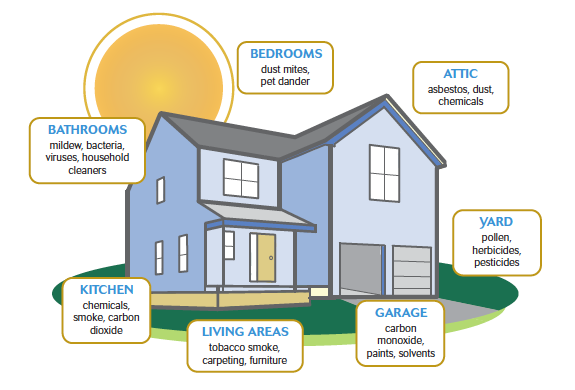Most people spend a significant time indoors, whether it is in their homes, at the office or at school. Indoor air quality has become an increasingly important issue over the years, since poor quality can lead to health and comfort issues.
Common complaints include nausea, headaches, skin problems and allergies. By improving ventilation, eliminating sources of pollution and keeping your home clean, you can avoid these common health problems.
Proper Ventilation is Key
One simple way to lower the concentrations of indoor air pollutants in your home is to bring fresh air indoors. Opening windows and doors will help to lower concentrations of carbon dioxide, as well as toxic chemicals.
Get into the habit of opening your windows on a daily basis, when the weather permits, even if just for 5 to 10 minutes. You should, however, be mindful of outdoor allergens during the fall and spring.
Keep it Clean
Dust builds up over time, which is why it’s important to keep your home clean. Reduce exposure to allergens, including dust mites, by keeping key areas of your home clean.
Make sure you wash your bedding on a weekly basis. This should include sheets, pillows and comforters. You should also try to mop and vacuum the floors at least once a week, using a high efficiency particulate air (HEPA) vacuum cleaner. You can prevent dirt from entering the home by using a doormat and asking people to take off their shoes when indoors.
Another important step is to have your heating and cooling ducts cleaned, as these harbor common indoor allergens. If you allow these to build up, they will constantly spread throughout your home and continue to cause allergic reactions. Heating and cooling ducts don’t just harbor dust and debris; they also harbor mold, fungi, microbes, pollen and even small animals.
Reduce Chemical Pollutants
If someone engages in an activity that is likely to deteriorate indoor air quality, such as smoking, painting or using harsh cleaners, then you should make and extra effort to open the windows. If possible, conduct these activities outdoors.
This is particularly advised when it comes to activities that may create high levels of pollution, such as paint stripping, painting, sanding, gluing or rock polishing.
You should minimize the use of cleaners with strong fragrances, harsh cleaners or solvent-based cleaners. Synthetic fragrances should be avoided, since many of the gases evaporating from products such as air fresheners and perfumes are in reality harmful Volatile Organic Compounds. Instead, opt for fragrance-free products and use natural products where possible.
Control Humidity
Keeping the humidity levels in your home at between 30% and 50% will help to limit the growth of mold, as well as the presence of dust mites. You can use a monitor to track humidity levels, and take appropriate action when necessary.
This can include things like using a dehumidifier, if necessary, and ensuring proper ventilation. You should also ensure that you open the windows when taking a shower or bath and while cooking, or use an exhaust fan instead.
